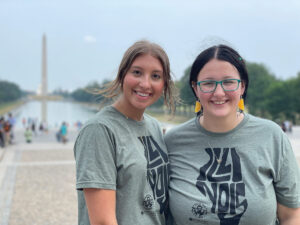I’ve been involved in education for a long time, and I’ve worked with kids from all over the United States. There is an unfortunate viewpoint that many young people share: opportunity is something that exists elsewhere.
We all worry about that, don’t we? We worry that, after our kids grow up and leave, our towns will age and eventually wither and die. It’s a legitimate concern. Compared to a national average of 37.5, some communities, especially in the Midwest, have an average age around 50!
As I travel around the country, speaking about Millennials (the children of the Baby Boomers) and the potential benefit they hold for our communities, it’s clear that leaders understand the critical importance of connecting with young people. They understand that a real, meaningful connection can transform the future of their communities.
What leaders don’t know, though, is how to do it. Have you ever spent time talking with or working with a group of high school students? It can be a pretty intimidating thing. The level of disengagement can be pretty discouraging to see.
This generation though, the generation we call Millennials, has the potential to be the greatest generation of inventors, innovators and leaders we’ve ever produced. They’re smarter and better informed than any young people we’ve seen. They know how to gather information and how to find things out, and are comfortable learning a great deal on their own.
What they need, though, is the collection of critical life skills that will make them successful: problem solving, synthesizing information, collaborating, communicating and a thirst to learn new things.
The good news is this: by using your best resource (your people), you can connect with your young people in a way that will give them the skills they need and change the way they view the intersection of their future and your community.
I’ve spent the last five years teaching an innovative class called CEO (Creating Entrepreneurial Opportunities). It brings together business people, community leaders, and students from six different high schools. CEO is funded solely by business investors and meets in businesses, not schools.
When our students visited more than 70 area businesses last year, it changed the way they viewed their communities. I regularly heard, “I’ve driven by this place my whole life, and I never knew what cool stuff was going on in there!” and “I had no idea we had businesses like that here!”
When our students listened to more than 140 guest speakers last year, I regularly heard, “There are such cool people here!” and “It’s great the way this person is so successful, and they care about me and our community. I think I want to be like that.”
While in the CEO program, students run a class business and then start their own businesses…real, viable businesses. Because of the involvement of our business people, students have a built-in network of people to help them in their businesses. Whether it’s manufacturing, design, marketing, legal or financial, students connect with business people in a way that establishes an important connection to our community.
Have a guest speaker once a year? Nice, but it doesn’t establish any sort of relationship with students. Visit a business once a year on a field trip? Great, but it also doesn’t establish that important relationship.
Allow your students to learn from your business and community leaders? Give them the opportunity to learn firsthand about the great things in your community? Give them the opportunity to do something real and tangible, like start a business in your community? That is transformational.
One student told me last year, “Before I took the CEO class, I could never have imagined myself coming back here. Now that I’ve been in CEO, I can’t imagine myself anywhere else.” That’s the kind of comment we want to hear from our students!
We do a survey with our students at the beginning and end of the year. One of the questions we ask is, “Would you consider coming back here to live later in your life?” A couple of years back, three of our 25 students said they were interested in coming back at the beginning of the year. At the end of the year, 21 of 25 said they were interested. That’s what happens when you connect your young people and your business and community leaders in a real, tangible way.









